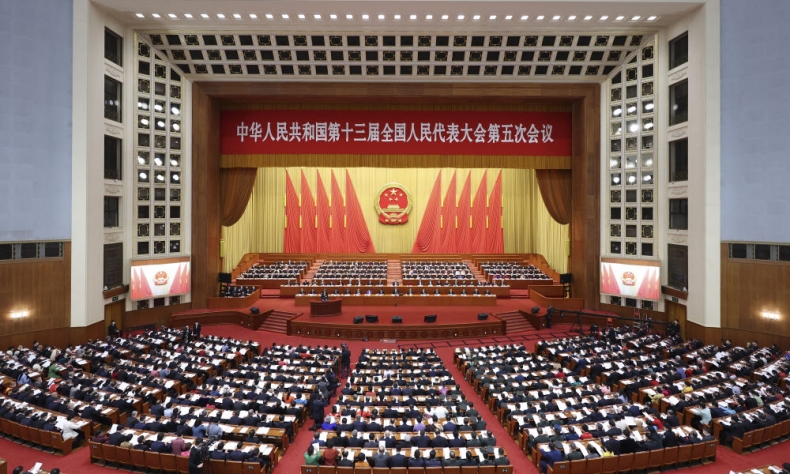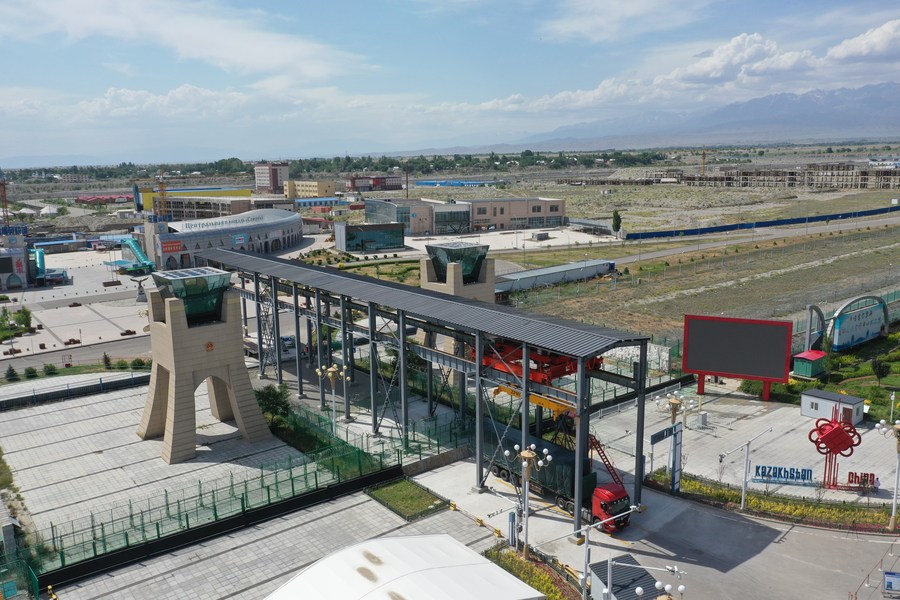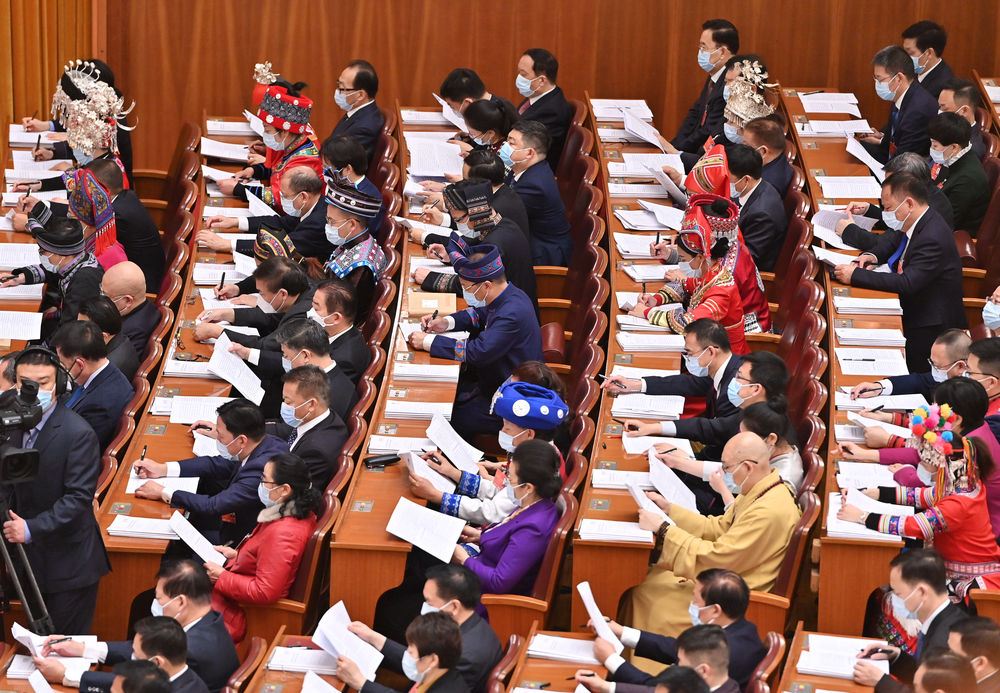China’s NPC Is Commendable and Xinjiang Has a Bright Future

China’s current ethnic policy works well, not only does it protect ethnic diversity, but also safeguard national unity.
Editor’s note: In recent years, some western politicians and media have wantonly attacked China by smearing the governance in Xinjiang and fabricating the so-called “human rights abuses” in the region. In an interview with People’s China magazine, Murata Tadayoshi, an honorary professor at Japan’s Yokohama National University and an expert on contemporary Chinese history, shared his insights into China’s progress in human rights and the National People’s Congress system as part of socialist democracy with Chinese characteristics. The excerpts of the interview are as follow:
A Uyghur torchbearer at the opening ceremony of Beijing 2022 Olympic Winter Games unexpectedly became a focus of some western media when reporting the games. They portrayed the Uyghur athlete as a “provocation” to all those who accused China of so-called “human rights abuses” in Xinjiang.
Some western governments hyped the Xinjiang issue during a yearlong media campaign. I believe China’s decision to choose a Uyghur athlete as torchbearer was a good “answer” to the original provocation by certain interests. The decision proves the equality and unity among all ethnic groups in China, whereas western media’s intentional distortion and penchant for initiating confrontation is truly baffling.

Xinjiang is on the way to a better future
Most Uyghur people live in northwest China’s Xinjiang Uyghur Autonomous Region (hereinafter referred to as Xinjiang), especially the southern part of Xinjiang. Because of its landlocked geographical environment, the region was an isolated and poorly developed society for a long time, providing fertile ground for extremism and terrorism. The Chinese government has offered enormous amounts of fiscal assistance to alleviate poverty and eradicate terrorism in the region. But financial aid is not enough to solve the problems. Therefore, the government turned to a comprehensive policy package, creating jobs for local people and encouraging them to live an affluent life by working.
Coordinated by the central government, prosperous provinces and regions paired up with Xinjiang to assist in its development goals. Provincial governments assigned personnel to carry out knowledge and expertise training in Xinjiang, and coastal enterprises invested in the area to help lift local people out of poverty. The assistance provided by sister provinces and municipalities not only promoted stability and development of Xinjiang, but has also given the region a brand-new outlook for a better future.
Since the Chinese government put forth the Belt and Road Initiative (BRI) in 2013, Xinjiang has become a critical part of the land Silk Road Economic Belt. Authorities invested heavily in the region’s infrastructure. Since the first China-Europe freight train set off in March 2016, the railway port in Xinjiang’s Horgos has grown into an international logistics hub linking to 45 cities in 18 countries, including Germany, Poland, Turkey and Russia.
Such development would have been impossible had there been suppression of human rights in Xinjiang. The census conducted last year shows the population of Uyghurs is 11,624,257 (June 2021). If western claims are to be believed, one to three million people in Xinjiang were forced to work, detained or even killed, amounting to one victim in every one or two families. It would have resulted in large numbers of refugees fleeing to neighboring countries for shelter. The Islamic world would have been the first to speak up against such atrocities. But, they did not. Why? because the truth is China’s northwestern neighbors like Kazakhstan and other Islamic countries support China’s governance in Xinjiang. This fact alone suffices to prove that there couldn’t be suppression of human rights in Xinjiang. Just a little common sense will help us see the facts clearly.

The Japanese parliament’s unwise act
Unfortunately, Japan’s parliament adopted “the Resolution Regarding the Serious Human Rights Situation in Xinjiang Uighur and Other Areas” on February 1, 2022, the day of the Chinese Lunar New Year. The resolution is not beneficial at all, especially to Japan. While it didn’t mention China by name in the resolution, it listed Xinjiang and Hong Kong, and even used the term “south Mongolia” as a denial of “Inner Mongolia Autonomous Region” the official name of the region.
In passing the resolution, parliament members accepted the groundless claims of Mongolia and Xinjiang secessionists in Japan. As well-educated people, the parliament members should have been able to tell right from wrong based on solid facts. Their inability to do so underscores their declining quality in general and seriously impacted Japan-China relations.
We cannot turn a blind eye. I find it worrying that there are fewer efforts in Japan to truly understand China’s policy and measures. It’s particularly regrettable that many Japanese cannot go to China to see the facts for themselves due to the Covid-19 pandemic. Once Japanese people can travel to China and exchange ideas with Chinese people, they will realize that China does not suppress any ethnic minority. While people cannot make international travel freely today as before, the rumors forged by western countries have spread across the world.

Human rights progress in China
Human rights must be understood within the scope of specific times. The theme and contents of human rights also differ from country to country given their different national conditions, social forms, and cultural traditions. China has undertaken a huge change since the reform and opening-up started in 1978. At first, China’s priority was to lead the people to strive for Xiaokang, or moderate prosperity, by which people’s basic needs for clothing, food and housing could be met. Entering the 21st century, the Chinese have no reason to worry over living necessities thanks to rapid economic growth and social progress. As the ancient Chinese saying goes, ‘well fed, well behaved.’ The human rights theme in China today is much different from what it was in the past.
Committed to building the country under the rule of law, China is working on legislation and improving systems in all aspects to ensure people live in an equal, safe and stable society. The right to life came first when the economy was bad, but now the situation has changed. With access to abundant material life, people wish to live a life with dignity, which is the theme of the current development of China, and for which China is taking many admirable actions.
I think there is much for Japan to learn from China. Take the ethnic policy as an example. China implements the system of regional ethnic autonomy. China is composed of 56 ethnic groups who reside all over the country in a rich diversity of cultures, religions and so on. China’s current ethnic policy works well, not only does it protect ethnic diversity, but also safeguards national unity.
Unlike Japan’s parliamentary election system, China’s National People’s Congress (NPC) system combines direct election with indirect election together. Deputies below the county level are elected directly by voters, while those above the county level are elected indirectly. Importantly, every ethnic group has at least one deputy to the NPC to ensure their voices are heard. This institutional design makes each ethnic group embrace national pride and preserves ethnic languages and cultures. It is indeed a good practice. I find it ridiculous then to say China is not a democratic state by giving the reason that “there is no election in the country”.

Japan also has ethnic groups, like the Ainus, but they are barely recognized officially by the government. For example, there is no exclusive seat for the Ainus in Japan’s parliament. Ainu parliament members are elected every once in a while, but not as a result of their ethnic identity. Ainus are also not taught about their ethnic history and culture in primary schools. But the situation goes beyond Ainus. Japan doesn’t give enough care to other minority groups such as Japanese Chinese, Japanese Koreans, or even Okinawans for that matter. In terms of ethnic culture representation and education, China is ahead of Japan.
The right way to promote human rights
Seeing is believing. If there were violations against human rights, the problem should be resolved through the United Nations or other international organizations. Actually, the United States and other western countries run in the opposite way. They spread rumors of human rights abuses and interfere in internal affairs of other countries. By doing so, they have displayed a woeful ignorance of China.
As far as human rights are concerned, every country should focus on its domestic problems and make efforts to solve them. In the United States, death by gun violence takes place frequently. In such a society where people need to use guns to protect themselves, there is no way to talk about human rights. While a country has its own human rights problems, it needs to have a good understanding of other countries. The social systems of China and Japan are different. Japan should always keep that in mind and try to understand the real situations of its neighbor. If we can do that, we will find that China’s systems, such as the NPC system, are commendable and worth reference.
The article reflects the author’s opinions, and not necessarily the views of China Focus.
Translated by Bai Shi
Copyedited by Jamie Wright
 Facebook
Facebook
 Twitter
Twitter
 Linkedin
Linkedin
 Google +
Google +










